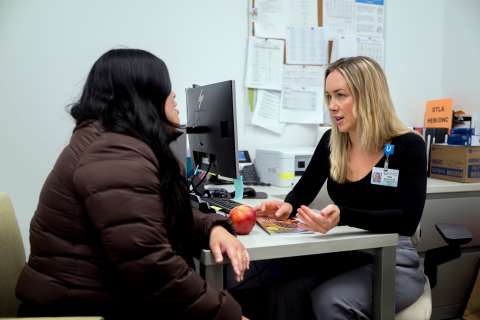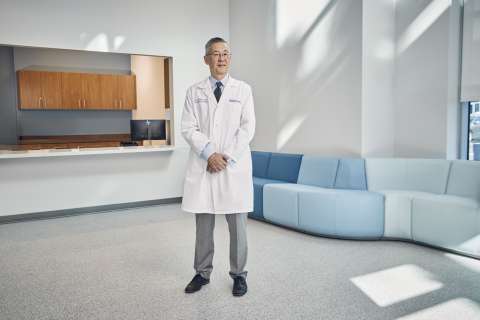After Wing Ng lost his wife to breast cancer in late 2023, he plunged into grief like he had never felt before.
“I barely could function,” Ng said. “I really never expected this, but I should have. My expectations were that my previous life experiences would have prepared me for this.”
The intensity of his pain drove him to another new experience – exploring his emotions through counseling.
Ng, now 61, began meeting last year with Jenny Tran, PhD, a clinical psychologist at the Simms/Mann UCLA Center for Integrative Oncology.
“Being a guy, being Asian, I’m probably not too open. I’d never done any real in-depth soul searching,” he said. “Just letting things out with Dr. Tran, I probably did cry about innocuous topics, but the emotions would just come out. The counseling sessions allowed such emotions to be explored, released and not be bottled.”
Underused resource
Ng, a retired architect who was born in Hong Kong, moved to the United Kingdom after grade school and later to the United States as a teen. He said he didn’t grow up openly discussing his feelings.
“I know I never had any sort of conversations with my parents in that manner,” said Ng, who lives in Monterey Park. “I imagine there are lots of guys like me.”
Overall, Asian Americans are 50% less likely than other racial and ethnic groups to seek mental health services, according to UCLA Health experts.
Dr. Tran said that stigma can lead to underutilization of counseling within the Asian American community.
“Part of that stems from the belief that experiencing distress and expressing those emotions is a personal failure, is shameful, or is disruptive for the family,” she said.
Traditional Asian values focus on endurance, honor and prioritizing the well-being of the family over oneself, Dr. Tran said.
“Some of those values and ideas can make it difficult for folks to recognize that what they’re experiencing is actually sadness, fear or grief, and that those are all understandable and normal responses,” she said.
Trust earned with time
Ng and his wife, Lucia Chang, met Dr. Tran at the UCLA Health Alhambra Cancer Care Center after being initially referred by oncologist Dorcas Chi, MD. While Chang underwent chemotherapy for metastatic breast cancer, Dr. Tran would drop by to chat and lend support.
She mentioned available services, including counseling and support groups.
While the couple didn’t participate in any formal programs, they enjoyed the conversations. In retrospect, Ng said he thinks they could have benefitted.
“Dr. Tran did offer things to us,” he said. “We never, I guess, thought we would need it even though we should have.”
Chang passed away in December 2023, less than a week before their 28th wedding anniversary. Ng called Dr. Tran to share the news.
She let him know that she was available to meet with him when he felt ready.
“I was relieved and thought, ‘Oh wonderful! I must take advantage of this. I need the emotional support,’” he said. “I didn’t know where we were going to go with it.”
Exploring layers
Although their counseling sessions were virtual, Ng felt a quick rapport with Dr. Tran because of the connection she built with the couple during Chang’s treatment.
“A familiar face over time always lends to easier conversations that can lead to more open future dialogue,” he said. “In a clinical setting, I was able to open up more easily because I know that what I share will be confidential, that I am there to be helped and not judged.”
Dr. Tran said she knew Ng had many layers in his experience. During their sessions, they discussed cultural norms around mourning and expression of grief as a man.
“I’m a child of immigrants, born and raised in California, and although my parents endorsed traditional Asian American cultural values, being part of the millennial generation and growing up in Los Angeles County shaped my attitude about mental health and influenced my exploration of it within myself and with others,” Dr. Tran said.
“This is different for someone like Wing who immigrated to the United States during a critical developmental period, who grew up in a different generation, and was raised with more traditional Chinese values that promoted maintaining group harmony and avoiding conflicts.”
Ng lost his father to cancer at age 16, six months after his family immigrated to the U.S. About 10 years ago, his mother died of cancer only six weeks after her diagnosis.
As sad as those losses were, he said, nothing could prepare him for losing his wife, a fellow architect whom he met in college some 40 years ago.
“Those experiences added all up together doesn’t even come close to what I’ve felt the last 18 months,” Ng said. “I’ve never experienced the intensity of what I’m experiencing. I’ve never cried so much. I’m quite emotional over any number of things.”
New perspective
Dr. Tran said Ng was able to let go of the idea that there was a right way to grieve or mourn as he allowed himself to experience his full range of emotions.
“A big part of his life was suddenly gone – his favorite person, all their future plans and untold stories,” Dr. Tran said. “He was able to recognize this is his own grief experience, because this is his own relationship with Lucia, and no one else can tell him how to love her or how to grieve her.”
Ng said he’s trying to follow Dr. Tran’s suggestion to be gentle with himself.
“This current journey is about learning more about myself and how I am and will be in dealing with the aftermath of my wife’s death,” he said. “It’s day-to-day and month-to-month. Slow going, but I continue to work on it.”
His experience with grief and working through his feelings has influenced Ng’s perspective. He recalled recently observing a young Asian American couple at a restaurant. The man seemed to rebuff the woman’s desire for emotional connection.
“He was basically a brick wall,” Ng said. “I related that back to my relationship with Lucia. She was the wise one. Was I ever doing that across from her when she’s pouring her heart out?”
Ng said he wanted to share his experience so that others, especially Asian men and men in general, could benefit from what he’s learned.
“I would say to give themselves every opportunity to experience counseling and that it is part of the healing process,” he said.
He’s recommended counseling to friends who have been diagnosed with cancer and are undergoing treatment.
“I am thankful in the sense that I think the experience brings me a lot closer to dealing with emotions and everyday observations because as observant as I think I am, I know that in the past I have glossed over things for expedience and to avoid awkwardness,” Ng said. “There needs to be a better balance. My goal is to be more in tune with myself and others.”





